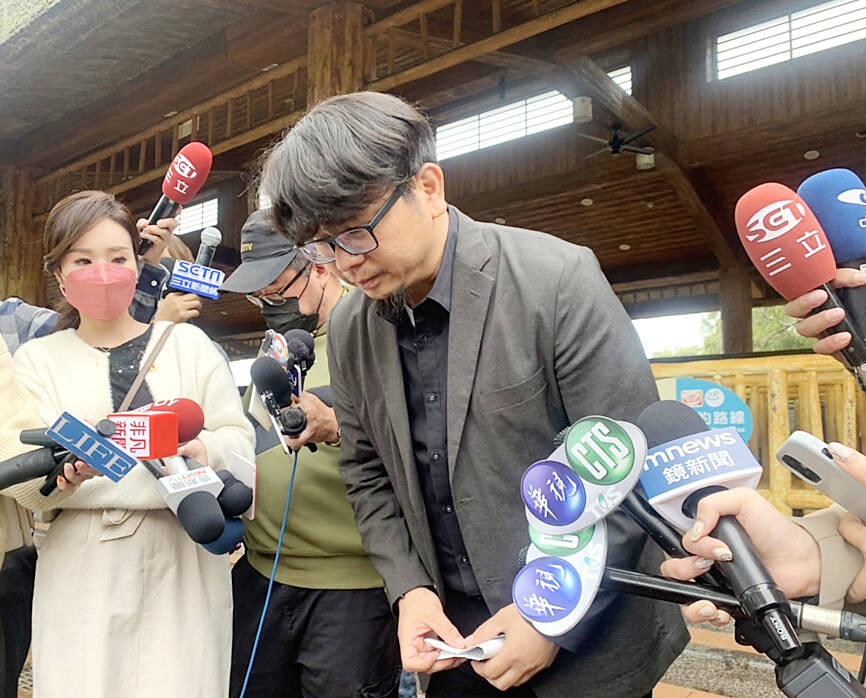Leofoo Village Theme Park yesterday apologized and said it owned the baboon that had escaped earlier this month and was killed on Monday.
It had earlier denied that the animal came from the park.
The baboon, which had been sighted on the loose in Taoyuan since March 10, was captured on Monday afternoon before dying later in the day from serious injuries.

Photo: CNA
Multiple parties involved in the attempted capture of the animal have given different and often contradictory accounts over what led to a firearm being discharged at the scene and the baboon being fatally wounded.
During a news conference at the park yesterday, park senior director Yeh Chung-yueh (葉忠岳) bowed and apologized, saying it remained unclear how the baboon had escaped.
Following the incident, the park closed its Wildlife Kingdom zoo area to take stock and assess its facilities, he said.
The park has not decided when the area would reopen to visitors, he said, adding that it might reopen in sections.
The park had checked the baboon enclosure on March 18 and determined that it was secure, Yeh said.
Explaining the park’s initial response that the baboon had not escaped from the park, Yeh said the park’s zoo area covers several hectares with lots of open space, and that taking stock of its animals was challenging.
The park’s senior supervisors would be reprimanded for the oversight, he added.
“Leofoo Village will boost security measures in the zoo area, including the use of a more scientific method to identify and count the number of animals,” he said.
Asked whether the park would pay for the use of public resources to track the animal, Yeh sidestepped the question, saying that the park’s main concern at present was taking stock and ensuring the safety of the animals.
As to whether the animals in the park would be chipped, Yeh said the park’s position was that microchipping was “inhumane,” as it requires the use of tranquilizers.
The park would “consult experts” on how to best track the animals, he added.
Asked whether any other animals had escaped from the park, Yeh said that an investigation was under way.
Separately, the Hsinchu County Agricultural Department said that under the Wildlife Conservation Act (野生動物保育法) there is no legal requirement for wild animals held in captivity to be microchipped.
Rules for wild animals are different from those for pet dogs and cats, which are stipulated in the Animal Protection Act (動物保護法), it said.
When it comes to the management of captive wild animals, city and county governments are limited to simply requiring zoos to register the animals, it said.
“We hope the central government will consider amending the law to require that wild animals also be microchipped to prevent a recurrence of incidents like the death of this baboon,” it said.

Taiwan is to commence mass production of the Tien Kung (天弓, “Sky Bow”) III, IV and V missiles by the second quarter of this year if the legislature approves the government’s NT$1.25 trillion (US$39.78 billion) special defense budget, an official said yesterday. Commenting on condition of anonymity, a defense official with knowledge of the matter said that the advanced systems are expected to provide crucial capabilities against ballistic and cruise missiles for the proposed “T-Dome,” an advanced, multi-layered air defense network. The Tien Kung III is an air defense missile with a maximum interception altitude of 35km. The Tien Kung IV and V

The disruption of 941 flights in and out of Taiwan due to China’s large-scale military exercises was no accident, but rather the result of a “quasi-blockade” used to simulate creating the air and sea routes needed for an amphibious landing, a military expert said. The disruptions occurred on Tuesday and lasted about 10 hours as China conducted live-fire drills in the Taiwan Strait. The Civil Aviation Administration (CAA) said the exercises affected 857 international flights and 84 domestic flights, affecting more than 100,000 travelers. Su Tzu-yun (蘇紫雲), a research fellow at the government-sponsored Institute for National Defense and Security Research, said the air

A strong continental cold air mass is to bring pollutants to Taiwan from tomorrow, the Ministry of Environment said today, as it issued an “orange” air quality alert for most of the country. All of Taiwan except for Hualien and Taitung counties is to be under an “orange” air quality alert tomorrow, indicating air quality that is unhealthy for sensitive groups. In China, areas from Shandong to Shanghai have been enveloped in haze since Saturday, the ministry said in a news release. Yesterday, hourly concentrations of PM2.5 in these areas ranged from 65 to 160 micrograms per cubic meter (mg/m³), and pollutants were

Taiwan lacks effective and cost-efficient armaments to intercept rockets, making the planned “T-Dome” interception system necessary, two experts said on Tuesday. The concerns were raised after China’s military fired two waves of rockets during live-fire drills around Taiwan on Tuesday, part of two-day exercises code-named “Justice Mission 2025.” The first wave involved 17 rockets launched at 9am from Pingtan in China’s Fujian Province, according to Lieutenant General Hsieh Jih-sheng (謝日升) of the Office of the Deputy Chief of the General Staff for Intelligence at the Ministry of National Defense. Those rockets landed 70 nautical miles (129.6km) northeast of Keelung without flying over Taiwan,